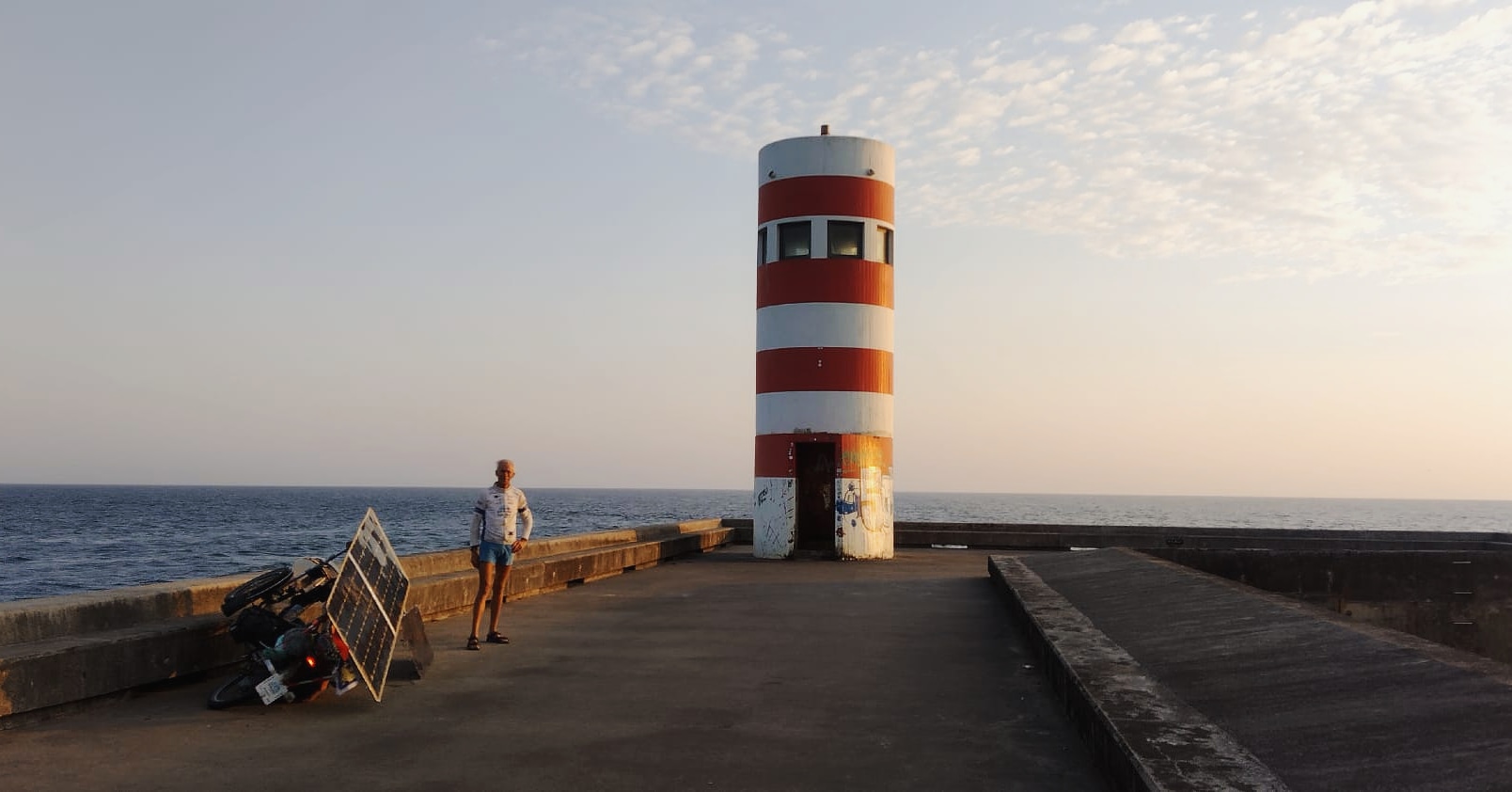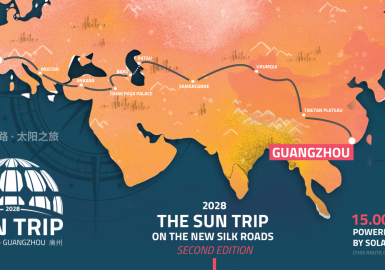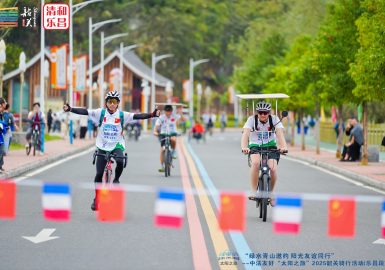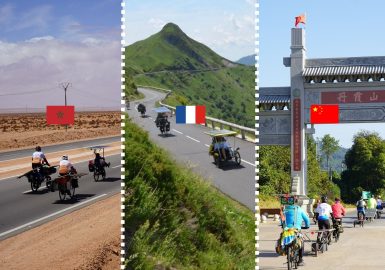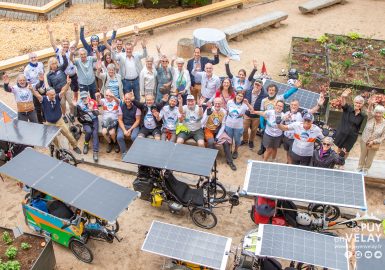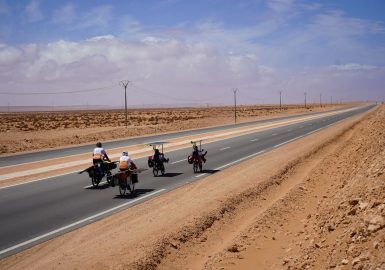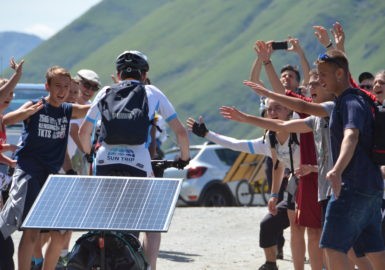1/ How are you doing? Your mood, your physical condition, your bike?
I’m fine physically and mentally. At the beginning I had to get used to everything again. Every day after the ride I was completely exhausted and couldn’t do much more than sleep and rest from the day’s activities. People sometimes think it’s just a short drive from here to there, but you have to take that into account, like where you drive, the quality of the road, the food, the drink, getting sleep, the weather, the trees that can disrupt your energy supply, how much energy you can still use, where and when it’s best to take your time to recharge… And then nothing can happen to the bike or the police.
Physically I want to get my bike back in order now and it seems to be fine, although I still have to be careful when it rained as I can still have electrical problems.
Morale is also very good and I sing regularly along the way. Sometimes this is disrupted when things don’t go my way, but I always try to make things go my way, which usually ends up being the case. Sometimes asking others for help, like when I arrived at the hotel which was full, they couldn’t give me a place to stay for the night and it was already late to continue. On the way out I just ask someone if they know a place to camp with a stream to wash up and they drop me off a kilometre away at a river, just outside the village where I can still eat at the restaurant.
2/ Best part since the beginning? Best memory?
I thought the best part was Provence and the Luberon. It was very hot but the winding roads up and down and the long canyon I followed with the river that tourists bathed in or crossed made me sing Merlin, a wizard and a boy who wanted to be a bird, a song by Tim Visterin that I was still learning in my third year of study with Master Van Der Goten when I was 9.
There were also chance encounters between other participants, notably with Michel and Ralf.
The three of us had completely different driving rhythms, but we used to meet for a long time in the same hotel in the evening, where we sometimes talked for far too long. Without them, I wouldn’t be here now and I might have collapsed without brakes.
3/ The most difficult moment for you?
I didn’t have any really difficult moments, but I had some frustrations when things didn’t go as I wanted.
The day with my electrical problems after a few heavy showers, with a bad weather forecast, an almost empty battery and then having to cross the mountains, I didn’t like it for a while but once the sun came back, it all resolved itself.
4/ Are you keeping the pace you had in mind at the start? Did you expect to outperform in China in 2018 when you placed 5th?
I got into a pretty good flow and I also expected it to be harder than China through the mountains and the different options for taking the roads. Before that China was easier, there was actually only one road with no roundabouts and speed bumps that they try to destroy your bike here.
I’m not really worried about fourth or fifth place because I never really saw it as a race, but that doesn’t mean I’m surprised by this performance, but with Raf I would be in fifth place now too.
A lot has also to do with the equipment you ride with, if everything stays intact and if not if you can fix it to be able to continue, but of course you also have to have the attitude not to lose courage too quickly but there you learn that you are dealing. This is often the time to relax a bit and leave everything for what it is, but also vice-versa to sometimes push to the end when necessary.
5/ What do you think of this Europe route compared to the 2018 edition? In terms of landscapes, road conditions, meetings…
I think that with the CheckPoints, it is a good idea. You feel a bit more comfortable because the distances are not so great, you can cut them into pieces and it is of course a more familiar environment, less exotic than China. I personally find these long stretches of road like the steppe in Kazakhstan and the Gobi desert attractive because there are so few of them and so it’s easier to get into a flow and still stay focused.
In Europe you have so many options that it will drive you crazy if you haven’t prepared or checked the route beforehand.
For example, when your GPS sends you through cities with roundabouts and speed bumps every few hundred metres, it can be frustrating. The sandy roads can be romantic and adventurous, but I think more for walkers and not if you want to go a certain distance. I want to get home eventually.
6/ Can you describe a typical day?
With sunrise, I want my bike to be perfectly positioned facing the rising sun. Thanks to my third panel, I have the advantage of being able to absorb extra energy when the sun is low. I then let the sun do its work while I wash at leisure, prepare costumes, check social networks and the route and have a hearty breakfast.
By this time, it’s 9am or 9:30am and the sun is so high that my fixed, non-rotating solar panels that can be turned towards the sun can absorb maximum solar energy.
Depending on the state of my battery, when it’s almost empty, I go for lunch and if not some snacks or bananas or nuts I play on the go. Around 6pm I stop again to eat, while my battery is recharging, and to see where I can find a place to sleep on my route and then continue a more or less long stretch to there.
Once I arrive at the hotel I settle in, wash up, have dinner and head back out to see where the sun rises so I’m well prepared the next morning to position my solar panels at sunrise. People ask me if I’m visiting any tourist sites or anything else, but that’s a whole sandwich I can fill my day with and yes, I go to a lot of places but I also drive past a lot. When things get a bit too ordinary at home, I like to go on these kinds of trips where there’s often something going on and you have to anticipate, but I also like to come back to the quiet of home.
Herman à Porto
